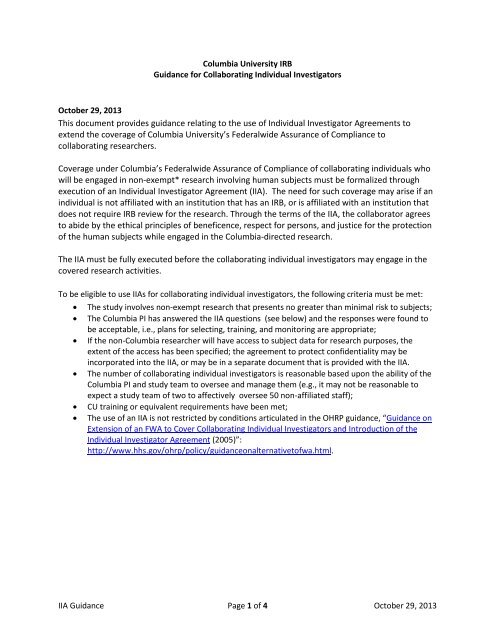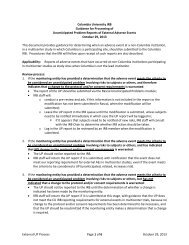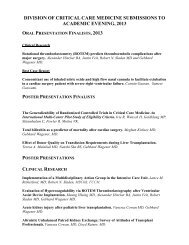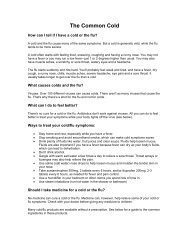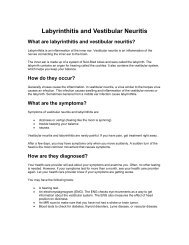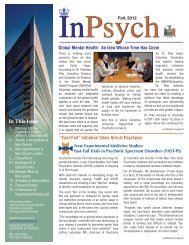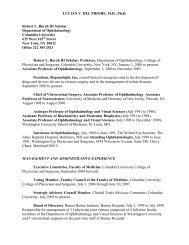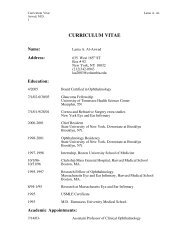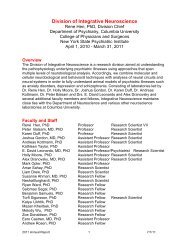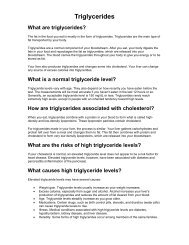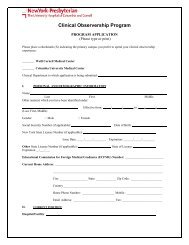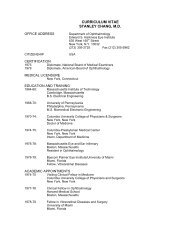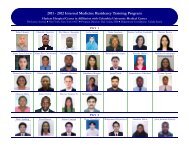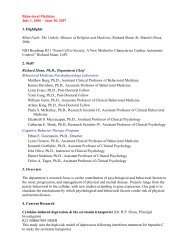Guidance for Collaborating Individual Investigators
Guidance for Collaborating Individual Investigators
Guidance for Collaborating Individual Investigators
You also want an ePaper? Increase the reach of your titles
YUMPU automatically turns print PDFs into web optimized ePapers that Google loves.
Columbia University IRB<br />
<strong>Guidance</strong> <strong>for</strong> <strong>Collaborating</strong> <strong>Individual</strong> <strong>Investigators</strong><br />
October 29, 2013<br />
This document provides guidance relating to the use of <strong>Individual</strong> Investigator Agreements to<br />
extend the coverage of Columbia University’s Federalwide Assurance of Compliance to<br />
collaborating researchers.<br />
Coverage under Columbia’s Federalwide Assurance of Compliance of collaborating individuals who<br />
will be engaged in non-exempt* research involving human subjects must be <strong>for</strong>malized through<br />
execution of an <strong>Individual</strong> Investigator Agreement (IIA). The need <strong>for</strong> such coverage may arise if an<br />
individual is not affiliated with an institution that has an IRB, or is affiliated with an institution that<br />
does not require IRB review <strong>for</strong> the research. Through the terms of the IIA, the collaborator agrees<br />
to abide by the ethical principles of beneficence, respect <strong>for</strong> persons, and justice <strong>for</strong> the protection<br />
of the human subjects while engaged in the Columbia-directed research.<br />
The IIA must be fully executed be<strong>for</strong>e the collaborating individual investigators may engage in the<br />
covered research activities.<br />
To be eligible to use IIAs <strong>for</strong> collaborating individual investigators, the following criteria must be met:<br />
• The study involves non-exempt research that presents no greater than minimal risk to subjects;<br />
• The Columbia PI has answered the IIA questions (see below) and the responses were found to<br />
be acceptable, i.e., plans <strong>for</strong> selecting, training, and monitoring are appropriate;<br />
• If the non-Columbia researcher will have access to subject data <strong>for</strong> research purposes, the<br />
extent of the access has been specified; the agreement to protect confidentiality may be<br />
incorporated into the IIA, or may be in a separate document that is provided with the IIA.<br />
• The number of collaborating individual investigators is reasonable based upon the ability of the<br />
Columbia PI and study team to oversee and manage them (e.g., it may not be reasonable to<br />
expect a study team of two to affectively oversee 50 non-affiliated staff);<br />
• CU training or equivalent requirements have been met;<br />
• The use of an IIA is not restricted by conditions articulated in the OHRP guidance, “<strong>Guidance</strong> on<br />
Extension of an FWA to Cover <strong>Collaborating</strong> <strong>Individual</strong> <strong>Investigators</strong> and Introduction of the<br />
<strong>Individual</strong> Investigator Agreement (2005)”:<br />
http://www.hhs.gov/ohrp/policy/guidanceonalternativetofwa.html.<br />
IIA <strong>Guidance</strong> Page 1 of 4 October 29, 2013
Procedures<br />
1. During the administrative review of a submission, if the IRB staff reviewer determines that the<br />
study proposes to use non-affiliated research staff, the IRB staff reviewer will assess whether the<br />
following elements are applicable and appropriately addressed:<br />
a. If data will be collected by an individual other than a member of the Columbia research team,<br />
that individual must be identified.<br />
1) If a letter of agreement to protect confidentiality already exits, it should be provided to the<br />
IRB.<br />
2) If an IIA will be utilized, the agreement to protect confidentiality may be covered by the<br />
terms of the IIA.<br />
b. The research study includes a plan <strong>for</strong> secure data collection, protection of the confidentiality of<br />
the data, and transport of the data back to the CU researcher, from the non-affiliated research<br />
personnel.<br />
2. The IIA questions provided in Appendix A will be <strong>for</strong>warded to the PI (e.g., as a return item or via<br />
email to avoid a return if there are no other issues that require a return).<br />
a. If the PI responses to the IIA questions are found to be acceptable by the IRB staff reviewer and<br />
the study is non-exempt, the staff reviewer will <strong>for</strong>ward the responses to the questions, along<br />
with a draft IIA, and the protocol Data Sheet and Study Description, to the Manager of the IRB to<br />
which the protocol is assigned.<br />
1) The Manager will make a recommendation to approve/disapprove the request that the CU<br />
IRB will act as IRB of record <strong>for</strong> non-affiliates.<br />
a) The Manager will <strong>for</strong>ward the material to the Associate and/or Executive Director of the<br />
IRB <strong>for</strong> review.<br />
b) Until otherwise notified, the request <strong>for</strong> reliance must be reviewed by the Manager of<br />
the IRB to which the protocol is assigned and the Associate and/or Executive Director of<br />
the IRB.<br />
2) Review of the protocol should proceed pending a decision to approve or disapprove reliance<br />
on the CU IRB <strong>for</strong> non-affiliates. Approval of the protocol, however, should not be issued<br />
until the reliance decision is made, unless the Associate or Executive Director have advised<br />
that an approval may be issued but enumerator involvement may not begin until the IIA is<br />
fully executed.<br />
3. If reliance on the CU IRB <strong>for</strong> non-affiliates is approved, the Manager will approve and sign the <strong>for</strong>m,<br />
and it will be <strong>for</strong>warded to the PI.<br />
a. The IRB may authorize the PI to sign IIA <strong>for</strong>ms instead of the IRB representative (e.g, this may be<br />
necessary in situations such as time-sensitive post-disaster research or when the study will be<br />
conducted in a remote location in which communication options are limited).<br />
b. If non-affiliates are non-English speaking, the IIA must be translated and an attestation of the<br />
accuracy of the translation must be provided. This requirement will be communicated in writing<br />
to the PI. The non-English speaking enumerator(s) must sign the translated version of the IIA<br />
unless an exception is authorized by the Associate or Executive Director.<br />
4. The researcher will either provide the signed IIAs with a list of names of non-affiliates to the IRB by<br />
email <strong>for</strong> attachment in Rascal, or will include the IIAs in a renewal or modification, if one is<br />
otherwise being submitted. In some cases (e.g., in protocols with many non-affiliated staff, or with<br />
studies conducted in remote locations) , the researcher may not be required to send copies of every<br />
signed IIA but must keep them in his/her records <strong>for</strong> tracking and audit purposes. The IRB will<br />
provide the relevant requirements when the use of IIAs is approved.<br />
5. IRB staff members will check the status of IIAs at the time of subsequent modifications and/or<br />
renewals.<br />
IIA <strong>Guidance</strong> Page 2 of 4 October 29, 2013
a. If IIAs have not yet been executed, the staff members will ask the researcher if any non-affiliates<br />
have per<strong>for</strong>med any research activities. If they have, the protocol may be considered out of<br />
compliance with IRB policy.<br />
b. If the procedures in the protocol have changed or if more enumerators than were originally<br />
approved need to be hired, the protocol may need to be re-evaluated to determine if it remains<br />
appropriate <strong>for</strong> the CU IRB to cover non-affiliated staff.<br />
6. For record-keeping purposes, the IRB staff reviewer will in<strong>for</strong>m the IRB Assistant Director <strong>for</strong><br />
Operations that IIAs have been executed <strong>for</strong> the protocol. This step is required to route the<br />
documentation to the IRB repository <strong>for</strong> these agreements.<br />
*For Exempt research:<br />
1. A <strong>for</strong>mal IIA is not required <strong>for</strong> exempt research. However, to assess whether the use of non-<br />
Columbia personnel is appropriate, the IRB staff reviewer will <strong>for</strong>ward the IIA questions to the PI.<br />
2. After the PI has answered the IIA questions and the responses are found to be acceptable by the<br />
Manager of the reviewing IRB or member of the IRB Administrative Review Committee, review of<br />
exempt studies may proceed.<br />
3. The responses to the IIA questions will be attached in Rascal as an external document by the IRB<br />
staff reviewer.<br />
IIA <strong>Guidance</strong> Page 3 of 4 October 29, 2013
Appendix A<br />
IIA Questions<br />
1. How will non-affiliated research staff (non-affiliates) be selected, i.e., by what criteria or with<br />
what qualifications?<br />
2. Will any non-affiliate(s) conduct research activities <strong>for</strong> this study as an employee of an<br />
institution or organization? If yes, indicate whether the institution or organization has an FWA<br />
and whether it regularly conducts research. Does that institution or organization have an IRB<br />
and is the proposed research required to be submitted to that IRB? Appropriate documentation<br />
(e.g., IRB approval at affiliate’s institution/organization; attestation that IRB approval at the<br />
affiliate’s institution/organization is not required, etc.) should be provided.<br />
3. Is any individual affiliated in any capacity, whether paid or unpaid, with Columbia, e.g., student,<br />
faculty, employee, volunteer?<br />
4. Describe how non-affiliates will be trained, e.g., by whom, covering what topics, etc. The nonaffiliates<br />
are expected to review the following items: 1) The Belmont Report: Ethical Principles<br />
and Guidelines <strong>for</strong> the Protection of Human Subjects of Research; 2) the U.S. Department of<br />
Health and Human Services (HHS) regulations <strong>for</strong> the protection of human subjects at 45 CFR<br />
part 46; 3) the FWA and applicable Terms of the FWA as posted on the Office <strong>for</strong> Human<br />
Research Protections (OHRP) website; and 4) the relevant Columbia University (CU) institutional<br />
policies and procedures <strong>for</strong> the protection of human subjects as found on the CU Institutional<br />
Review Board (IRB) website at: http://www.columbia.edu/cu/irb/.<br />
5. What procedures will non-affiliates be conducting, e.g., obtaining in<strong>for</strong>med consent,<br />
administering surveys, collecting data, interacting with subjects, analyzing identifiable data?<br />
6. Why is the researcher proposing to engage individuals who are not associated with Columbia or<br />
another institution in this project?<br />
7. What is the risk level of the procedures in which the non-affiliates will be involved?<br />
8. Describe how the Columbia study team will be communicating with non-affiliates and the<br />
subjects (e.g., research at external sites, international research, research with non-English<br />
speaking subjects).<br />
9. To what degree will the Columbia study team be supervising/monitoring the non-affiliates?<br />
Provide a plan <strong>for</strong> monitoring compliance (e.g., by assessing whether study procedures are being<br />
followed), security of data while it is in the possession of the enumerators, and safety of<br />
subjects (e.g., by ensuring that confidentiality, privacy, and contact procedures are being<br />
followed).<br />
10. How many non-affiliates will be participating?<br />
11. Are any non-affiliates non-English speaking?<br />
IIA <strong>Guidance</strong> Page 4 of 4 October 29, 2013


